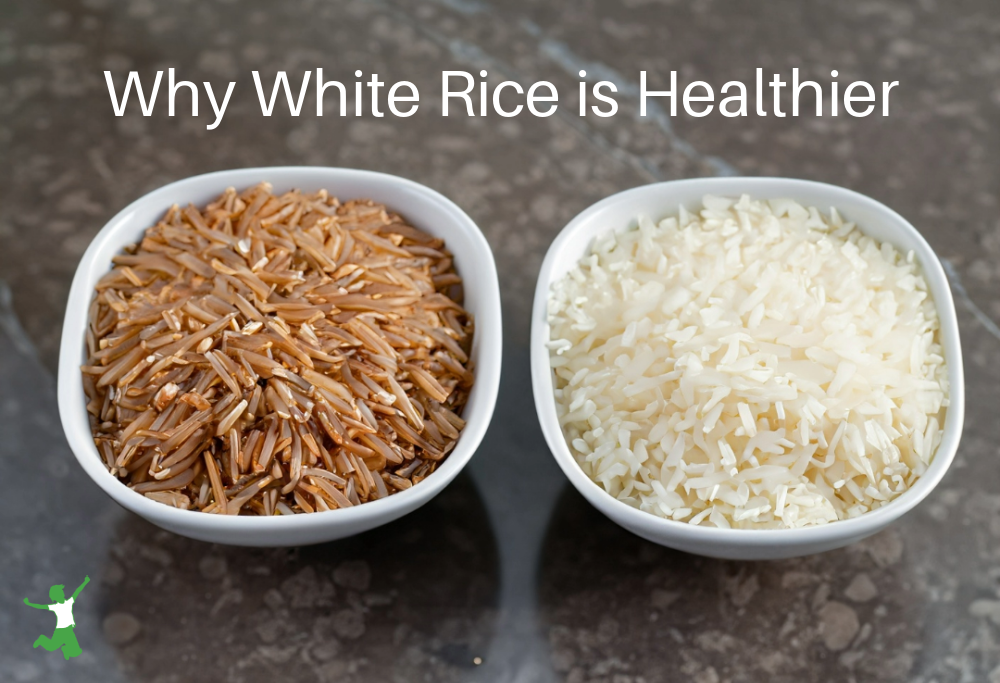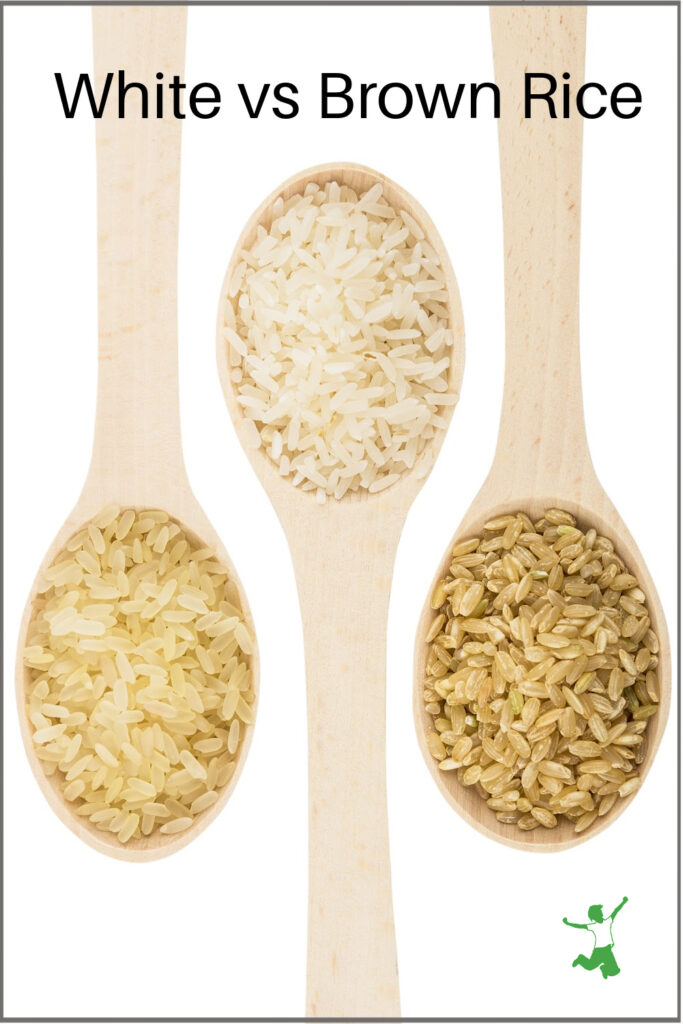The reasons white rice is healthier than brown rice as determined by research as well as which type traditional societies preferred consuming.

My article and video on healthy Chinese food drew some comments from readers who questioned my choice of rice.
Why was I using white rice vs brown? Isn’t brown rice the healthier choice, after all?
Ok, I’ll spill the beans, rice. Here are my reasons …
The truth is, neither my husband nor myself have ever enjoyed brown rice (although we love the nutty flavor and digestibility of wild rice).
Every time we eat brown, it just seems to not sit very well in our stomachs.
Even when it is sprouted or soaked before cooking, it, well, uh, sits like a brick for lack of a better word.
Why Some People Should Eat White Rice
White rice just seems to digest a whole lot better for us. That to me was reason enough to choose it over the brown rice.
We were also advised by an Ayurvedic MD back in the 1990s to stick with white basmati rice. This recommendation clinched the decision.
You are what you digest, after all – not necessarily what you eat!
End of story? Well, not quite.
Rice Fiber in Brown Harms a Compromised Gut
A few years back at the annual Wise Traditions Conference, I became familiar with a compelling book called Fiber Menace.
The author writes extensively about the dangers of a high-fiber diet as it pertains to a menu loaded with whole grains as pushed by the misguided Food Pyramid.
In other words, folks who eat a bowl of All Bran every morning to keep the bathroom visits regular are unknowingly ripping their insides to shreds.
The basic premise of Fiber Menace is that grain fiber plays a leading role in many gut-related ailments including colon cancer.
When I first learned of this information, my preference for white rice over brown rice started to make more sense.
Perhaps the brown rice didn’t digest that well because of all that fiber?
Chalk one up for the white rice.
White Rice Far Lower in Phytic Acid
A second piece of information came from author Ramiel Nagel.
In his book, Cure Tooth Decay, he writes about the devastating effects of phytic acid in the diet. Phytic acid is a very powerful antinutrient and blocker of mineral absorption in the gut.
Mr. Nagel identifies brown rice as very high in phytic acid.
What’s more, soaking brown rice does not reduce phytic acid by much at all!
Polished Rice is the Ancestral Form
Ramiel also maintains that the traditional method for preparing brown rice is never to eat it whole (with only the husk removed).
Rather, ancestral societies pounded brown rice in a mortar and pestle to polish it by removing the outer bran layer. This is the primary source of the phytic acid.
Nagel goes on to point out that experiments have shown that the milled and polished rice that results from this pounding process, has the highest mineral absorption.
In short, mineral absorption from whole brown rice is much less than white polished rice. This is because the phytic acid in the bran which is not reduced much by soaking, greatly interferes with the absorption process.
What About Arsenic?
A big issue with arsenic contamination in rice has emerged in recent years. Some folks have responded by no longer eating rice at all.
This is an overreaction, in my view.
Clean rice is definitely available if you know what to look for.
This article on how to avoid arsenic in rice details what to do. While soaking brown rice barely moves the needle on phytic acid, soaking white rice before cooking removes nearly all the arsenic!
Another option is to parboil white rice before using fresh water for a full cook if you don’t have time to soak.
Is White Rice Better Than Brown?
So it seems that brown rice is not necessarily a healthier choice than milled white rice.
Black or red rice would fall into the same category.
Obviously, whether you choose one or the other is a personal preference, but I hope this information helps you sort through the decision with a bit more clarity.
As for me and my family, we will be sticking with white basmati and jasmine rice (white basmati rice is more nutritious than plain white rice).
I currently buy this brand of rice in 25-pound bags as the most economical and high-quality choice.
Observation clued me in many years ago that brown rice was not something that was sitting well in my stomach or my husband’s.
As the years go by, more research is coming forth to indicate that this decision was the right way to go after all.
Do you eat white rice or brown rice in your home? Why or why not?

References
(1) Fiber Menace
(2) Living with Phytic Acid
More Information
Macrobiotic Diet and Extreme Vitamin D Deficiency
Tiny Teff Grains Deliver Big on Nutrition
How to Make Perfect Yellow Rice (Arroz Amarillo)
Millet: Healthy or Not?
Do Whole Grains Cause Cavities?








I also read that whole grains are generally more infested with fungus which is really bad if you want to control candida.
Yuck! Didn’t know that! Does soaking and cooking kill fungus like bacteria?
Wow! This rice thing is news to me. I’m going to have to try some basmati rice and see if the family likes it better. My husband and kids barely touch the brown rice that I keep insisting on making and wasting.
I may have to try grinding grains again knowing that it may actually be okay to sift the bran out. I’ve tried grinding in my Blendtec and it works well but we don’t like the grainy bits (the bran I presume) end up in the baked food. I thought the idea of grinding grains was to use the entire thing.
I so have to read more about all of this. Thanks for the great info
I recently mastered sour dough bread only to find that I immediately started feeling addictive and started gaining weight. I gave up even traditionally prepared grain.
Fiber Menace does not address coconut flour, which is very high in fiber. I used it in holiday baking, but I have a growing cocern about its GI affect.
Any expert advice. Sandra
I’ve recently mastered sourdough, too, and LOVE it. I love it a little too much, and like you am feeling a little addicted. I can eat 4 slices of the stuff, slathered in butter and not even feel at all full.
Maybe it’s time to me to go grain free- at least for a while.
I’m skeptical that white rice is better than brown, but it’s the same kind of skeptical I was when I heard that butter and tallow are good for you. I’d like to see more research backing up all this talk about rice. My husband will be so happy if we switch back to white rice.
How about this: Your body reveals what’s good for you by response. How does your body respond to brown rice consumption, and how does your body respond to white rice consumption. Simple as that. Correlate. Be aware. I find libido is a strong indicator as well as skin indications.
I love basmati rice, brown or white! I always soak the brown rice in water with lemon juice for at least 24 hours and haven’t had any problems with it. I also cook it with broth and everyone tells me that they normally don’t like brown rice but they like mine.
I did read that white rice has some kind of insoluable fiber-like component that is actually good for you, so I don’t feel guilty anymore when I use white rice for arroz con gandules (Puerto Rican rice with pigeon peas).
Hi Sarah,
What about jasmine rice? Your thoughts? Would love to know what you think…
B
I have 50 lbs of brown rice stored away.
What do I do now?!
Jenni – if you click on the link to the book details in the article (which is what she was saying informed her) it has a list of the research they cite. Not promoting either side of the debate, just defending the blogger’s methods 🙂
Hey,
my question is in regards to “keeping regular” – I have had an issue with this for as long as remember, and always thought it was normal to only go once a week (if that) until finally discussing it with people and realising it’s not. In the last year I have changed everything about my eating, and now have a diet rich in healthy fats, grass-fed & organic meat, vegetables, eggs etc. However, the way I stay “regular” is that I have 2 tablespoons of Chia Bran in a shake each morning. This allows me to go every second day, a huge improvement. When I dont have the chia, I become more irregular.
I have been working on my digestion quite a lot, however from the articles I’ve been reading on here lately I am starting to understand that the best way to digest grains is to remove the bran, its still a bit fuzy in my head but I guess what I’m asking is, is the chia bran good for me? Is there a better way to try and keep regular? Is digestion directly linked to being regular and therefore I still have a long way to go, being that I can’t seem to be regular without the aid of the chia bran. I always linked fibre to bran and am confused at the removal of it.
Some advice would be fabulous 🙂
Thanks
Aimee